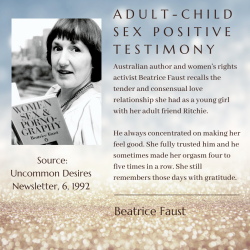One of our staff members is contributing considerably to a News Archiving service at Mu. Any well educated (Masters, PhD or above) users who wish to make comments on news sites, please contact Jim Burton directly rather than using this list, and we can work on maximising view count.
Beatrice Faust

Beatrice Eileen Faust AO (19 February 1939 – 30 October 2019) was an Australian Feminist author and women's activist, who wrote sympathetically on MAPs and youth sexuality. In 1966 she was president of the Victorian Abortion Law Repeal Association. She was also a co-founder of the Women's Electoral Lobby in 1972 and co-founder of the Victorian Union of Civil Liberties c. 1966.
She attended Melbourne University in the 1950s, where she became acquainted with Germaine Greer and they extended their feminist inclinations through various cogitations, earning her bachelor's degree in English and subsequently her master's degree. Much later in her life, the higher degrees of PhD and LLD were conferred upon her, the former for her 1991 book Apprenticeship in Liberty and the latter for her life's work in general, as a social reformist and researcher.
She was one of the first women to argue for civil liberties, abortion law reform and well-informed sex education for all. In 1966 she co-founded the Victorian Union of Civil Liberties to advocate for civil rights and, in 1972, the Women's Electoral Lobby, to agitate for legislative reform along specifically feminist lines and to give Australian women a greater voice in politics.
In 2001 Faust was awarded the Centenary Medal. In the same year, she was inducted into the Victorian Honour Roll of Women. In 2004 she was appointed an Officer of the Order of Australia.
Among her early writings, she contributed to the Australian edition of The Little Red Schoolbook, a book written by two Danish schoolteachers in 1969 which encouraged and instructed young people to question social norms. Translated into many languages in the early 1970s, the book aroused much controversy, moral panic, and even censorship via successful prosecution under the UK's Obscene Publications Act for a British edition.
Beatrice Faust's pro-sex feminist writings on MAPs and youth sexuality
- Faust, B. (1986). 'The paedophiles', in The Betrayal of Youth: Radical Perspectives on Childhood Sexuality, Intergenerational Sex, and the Social Oppression of Children and Young People, Edited by Warren Middleton (CL Publications: London), pp. 107-115.[1]
Faust explores Glenn Wilson's study of PIE members, "Childlovers: A Study of Paedophiles in Society" (1983)[2], discussing its flaws by contrasting it with Paul Gebhard's (1965) book-length study "Sex Offenders," and Paul Wilson's (1981) book "The Man They Called a Monster,"[3] on practicing MAP Clarence Osborne's positive age-disparate sexual experiences. Faust also makes general statements of interest, including criticizing early Feminists as mired by the popular sex-negative Victorian moralism of their era.
Orthodoxy teaches that children are, or should be, sexless, equating innocence with ignorance and immaturity. Suffragettes in all countries initiated age of consent and incest laws to protect children from sexual exploitation - which was a real hazard - and premature sexual awakening - which was a Victorian middle-class phobia. [...] Even now, in the 1980s, the problems continue. Despite much extensive research, children are still regarded as sexless" (p. 111). In ten detailed biographies [in Wilson & Cox], we find that no less that two hundred children were involved in relationships which lasted from six months to ten years. [...] Ages of consent and indecent assault laws did not prevent these incidents [...] [T]he pedophile is not simply playing a temporary role, for his/her preference is at the core of his/her sexual identity, although he/she can choose whether or not to express this proclivity. Therapy or punishment is useless. (pp. 112-114).
- Faust, B. (1995) "Child sexuality and age of consent laws: The Netherlands model." Australasian Gay and Lesbian Law Journal, 5, pp. 78-85.[4]
After studying children aged 5-15 years in four cultures, Ronald and Juliette Goldman concluded:
"One fact is abundantly clear. Children perceive it is the adults who have hang-ups about sex, and adults who deliberately or unconsciously withhold the information and knowledge the children seek" (p. 79).
Almost none of the child sexual abuse literature treats children as agents or developing sexual beings and certainly not as sexual agents. (p. 80). [...] Doubtless the obscurantism that confuses types of sexual contact, sex of children, and outcomes, may be justified by the urgency of the problem for the worst cases, but it is not purely altruistic. As with the suffragette generation, the concern to protect children is tainted by misandry, refusal to recognise that worst and best cases occur and a denial of sexuality itself. [...] Much information on the ill-effects of early child-adult sexual contact comes from children who are in therapy or involved with legal proceedings, or from adults who have entered therapy. Such information probably represents the worst cases (p. 81).
Gagnon's retrospective re-analysis of the Kinsey interview material (333 subjects) compares worst and best cases, showing that repeated exposure to aggression over time is extremely disorganising into adult life. About 80 percent of women who experienced repeated coerced sexual contact before puberty experienced serious difficulties in adult life, but fewer than 7 percent of women with lesser types of sexual contact before puberty experienced difficulty. (p. 81).
Some current activists against child sexual abuse misrepresent the best case/worst case contrast in these two accounts, quoting Gagnon as if he had said all adult-child contact was devastating, and condemning Kinsey as if he had dismissed all contact as trivial. […] [T]here are strong hints that many boys who have experienced non-violent relationships with men who are not family members suffer few, if any, ill effects, while girls who have had incestuous relationships suffer profoundly. (pp. 81-82).
Current age-of-consent laws and policies ignore male/female differences [...] The Netherlands provides a model that avoids this risk [... where] the age of consent remains 16 for both sexes but the possibility of consent between 12 and 16 is protected. A consenting child may refuse to complain while a child who wishes to complain may do so, and parents may complain on behalf of the child. The Child Protection Authority may complain on behalf of children in cases where they may have difficulty complaining against family members. Incest as such is not a punishable offence as the offence lies in the abuse of authority and the use of violence. Section 165a of the Code of Criminal Procedure obliges the public prosecutor to ask the minor's opinion of the desirability of a prosecution. In exceptional cases the public prosecutor may over-ride a child's wishes. (pp. 84-85).
Other works of interest:
- Faust, B. (1980). Women, Sex and Pornography (Penguin Books: Melbourne). [Book].
- Faust, B. (1991). Apprenticeship In Liberty (Angus & Robertson: North Ryde NSW). [Book].
External links
- Wikipedia article on Beatrice Faust, with sources used in this article.
References
- ↑ Faust, B. (1986). 'The paedophiles', in The Betrayal of Youth: Radical Perspectives on Childhood Sexuality, Intergenerational Sex, and the Social Oppression of Children and Young People, Edited by Warren Middleton (CL Publications: London), pp. 107-115.
- ↑ Glenn Wilson: "Childlovers: A Study of Paedophiles in Society" (1983)
- ↑ Paul Wilson, "The Man They Called a Monster" (1981)
- ↑ Faust, B. (1995) "Child sexuality and age of consent laws: The Netherlands model." Australasian Gay and Lesbian Law Journal, 5, pp. 78-85.
